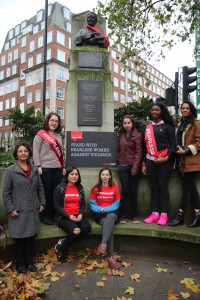One in three women experience some form of violence in their lives.
140 million women and girls worldwide have undergone female genital mutilation (FGM).
Almost 700 million girls have been married before the age of 18, often against their will.
Over the past two weeks, campaigners all over the world have been calling for an end to gender-based violence.
The ‘16 Days of Activism’ campaign takes place annually in the fortnight leading up to International Human Rights Day, on 10 December. It brings together individuals and organisations, giving them a platform to raise awareness of violence against women and girls (VAWG), create solidarity between women and galvanise global efforts to end violence. Since it first began in 1991, over 5000 organisations in almost every country on the planet have participated. The campaign is particularly significant this year, as it comes just two months after world leaders agreed a set of Sustainable Development Goals (SDGs) – including a goal on gender equality – to be achieved by 2030.
ActionAid is one of the many organisations participating in ‘16 Days’, so we spoke to campaign officer Caroline Jones to learn a bit more about the issues at stake and how they can be tackled.
Many of us already know the appalling figures that demonstrate why the ’16 Days of Activism’ campaign is such an important one. Violence against women and girls affects people worldwide, but one aspect of VAWG that often goes overlooked is the effect it has on reinforcing cycles of poverty. Caroline explains:
“As well as being a gross violation of women’s human rights, violence also stops women realising their full potential, which has a catastrophic impact on development. Fear or risk of violence on the way to, or at, school or work affects attendance rates and women’s ability to earn a living and have economic power in their own right.”
The devastating consequences of VAWG from a developmental perspective are part of the reason why ActionAid – best known for its work in humanitarian relief and poverty alleviation – participates each year in ‘16 Days’.
“It is also widely recognised that processes in politics, conflict prevention, peace-building, and governance are greatly strengthened by the involvement of women, creating policies and legal frameworks that address women’s specific rights and needs. So violence against women undermines all of this too.”
Caroline told us about some of the work that ActionAid has been doing over these past two weeks to mark the occasion. The events range from graffiti actions in Nicaragua and street theatre in Liberia, to cycling flash mobs in five different cities across Vietnam and, closer to home, a “takeover” of women statues by local activists around the UK to celebrate “fearless” women from history, those who “fought against past struggles, just as women are fighting to end violence today”.
In the “age of information” where we’re all bombarded by thousands of messages every day, it’s easy to wonder if campaign stunts like this really work anymore. Caroline is confident, though:
“Many campaigns over time have been won by people pushing their governments for change – more recently campaigns around the world for equal marriage or activists stopping the Keystone pipeline bringing crude oil from Canada to the United States. We need to stand together to collectively say no to the violence holding back whole communities.”
It remains to be seen whether the SDGs will achieve all they set out to in terms of ending VAWG once and for all. In the meantime, though, it is vital that organisations like ActionAid continue raising awareness and holding governments to account. The ‘16 Days’ campaign is a perfect example of this.
“If we all take action together, we can amplify our pressure and influence our governments’ policies, and challenge our community’s attitudes, to help end all forms of violence against women,” Caroline explains.
“A tall order maybe, but some of the greatest struggles in recent times felt unattainable at one time – we never thought we’d achieve universal suffrage, or the end of the transatlantic slave trade.”


